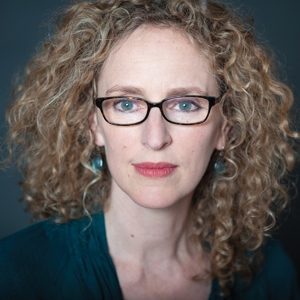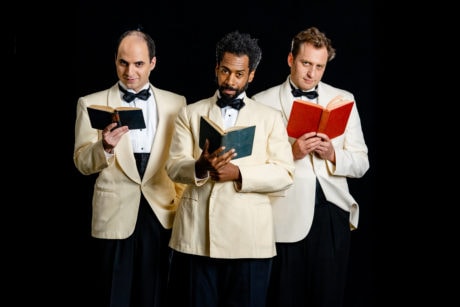Actor, director, and administrator Vivienne Benesch has many credits to her name. She is the Producing Artistic Director of the PlayMakers Repertory Company in Chapel Hill, North Carolina. For twelve seasons she was the Artistic Director of the Chautauqua Theater Company and Conservatory, where she directed over fifteen productions. She was on the faculty of Julliard and was the 2017 recipient of the prestigious Zelda Fichandler Award.

Now Benesch is making her Washington, DC and Folger Theatre debut by directing Shakespeare’s delightful early comedy about language, sexual attraction, and manners, Love’s Labor’s Lost. In the play, set in Spain, the King of Navarre challenges his three lusty, loyal courtiers to sign a pact that would create an “academy,” giving up most earthly delights – including love – for a period of three years. As soon as Navarre, Berowne, Longaville, and Dumain sign the pact, four intelligent young ladies arrive on a state visit and the king’s men one by one fall in love. The Princess of France, accompanied by her ladies Rosaline, Maria, and Katharine, of course, cannot immediately be let inside Navarre’s compound. They must camp outside.
DCMTA caught up with Benesch after a rehearsal to discuss Love’s Labor’s Lost.
Barbara Mackay: You have a special connection to this play, correct?
Vivienne Benesch: Yes, I know it well, because I appeared in it over twenty years ago. I played the Princess of France and fell in love with the play then. When the Folger’s Artistic Producer, Janet Griffin, called me and asked if I would be interested in directing it here, I said, “Oh, yes, please!”
What is it that you like most about Love’s Labor’s Lost?
I just love the true gymnastics of the language but I am also drawn to the heart of this play and how language is interrogated, exposed, and used for combat – of all sorts. Janet asked me early on about doing this play that is about men behaving badly in the #MeToo culture. Interestingly, what I’ve found in working on it is that it’s more about finding authenticity than it is about males misbehaving. It’s about the fact that men hide behind an idea of what they think love is or what they think truth is. So the whole play becomes an excavation until we get to what authenticity is.

People always talk about how important language is in this play. Do you agree with that?
Yes, but it’s not just language. It’s our word. What is the value of our words? How do we use them?
There are fencing matches of words, words, words, but there are also our oaths, what we swear and foreswear. There are more rhymes in this play than in any other of Shakespeare’s plays. That’s been really interesting to look into and see why. When characters talk in prose it’s really an anomaly. And you go, “What’s going on there?”
The characters really shape the comedy, don’t they?
In that “words, words, words” investigation, Shakespeare was playing around with a wonderful set of characters. You have your eight lovers, who in our world would be young diplomats. Then you have different strata of wordsmiths – and the higher their education level, the more ridiculous they become. Shakespeare invented the great character of Armado, “a fantastical Spaniard,” Holofernes, a schoolmaster, and Nathaniel, a curate. Then the clowns, Dull, Costard, and Jacquenetta, a country wench, who just speak straightforwardly.
I hear that when you saw the Folger’s Paster Reading Room, you decided to set the play there.

Yes, we are setting it at the Folger, in the early 1930s, when the Folger was first created. When I was taken into the Library for the first time, I literally thought, “What better ‘academy’ than this?” There’s a beautiful green carpet there, so we’re playing some theatrical tricks with how to go from inside to outside. Our scenic designer, Lee Savage, is very smart with space, so even though we can’t fit the whole reading room in, we will get in a lot of it. Of course, many audience members won’t know that the set depicts the Library, but many will and I hope that is a fun part of the evening.
Can you speak about the new music your composer and sound designer is creating for this production?
Lindsay Jones is phenomenal. Once he finishes this, he will have done all but two of Shakespeare’s plays. When we decided where and when the play would be set, that opened up great doors for him but it’s also a great challenge. Putting Shakespeare’s poetry to appropriate period music is hard. We’re using a combination of big band, swing, a bit of jazz, a little of Spanish opera. I always find it a great challenge when you put Shakespeare in a particular era, to make sure that the rhythm of the music is propelling the rhythm of Shakespeare and not getting in the way.
Your costumes are designed by Tracy Christensen.
Of course, they are period appropriate and elegant. And this is strange and fun…because we’re inside the Library, I’m doing a 1930s play with no smoking! Even back then, the Folger did not allow smoking in the Reading Room.
Any final thoughts?
I think Shakespeare had a ball when he was writing this. There isn’t a lot of plot in this play. In Act I, the main male characters make a vow and by the beginning of Act II, the vow means nothing. And then at the end, the temperature of the play completely changes – in a beautiful way. So you’ve got this collision of “carpe diem” and “grow up now because you never know when life is going to force you to.”

There’s something in Love’s Labor’s Lost that Shakespeare is starting to search out…the idea that there’s disharmony when people try to separate love from truth and learning. This play is a great ode to the fact that love is where we do our best learning. I find it a beautiful study in grace, ultimately. I hope it will be a very charming evening with deeper resonances, too – just a great spring fling.
Love’s Labor’s Lost plays from April 30 to June 9, 2019, at the Folger Shakespeare Theatre, 201 East Capitol Street SE, Washington, DC. For tickets, call 202-544-7077 or go online.




